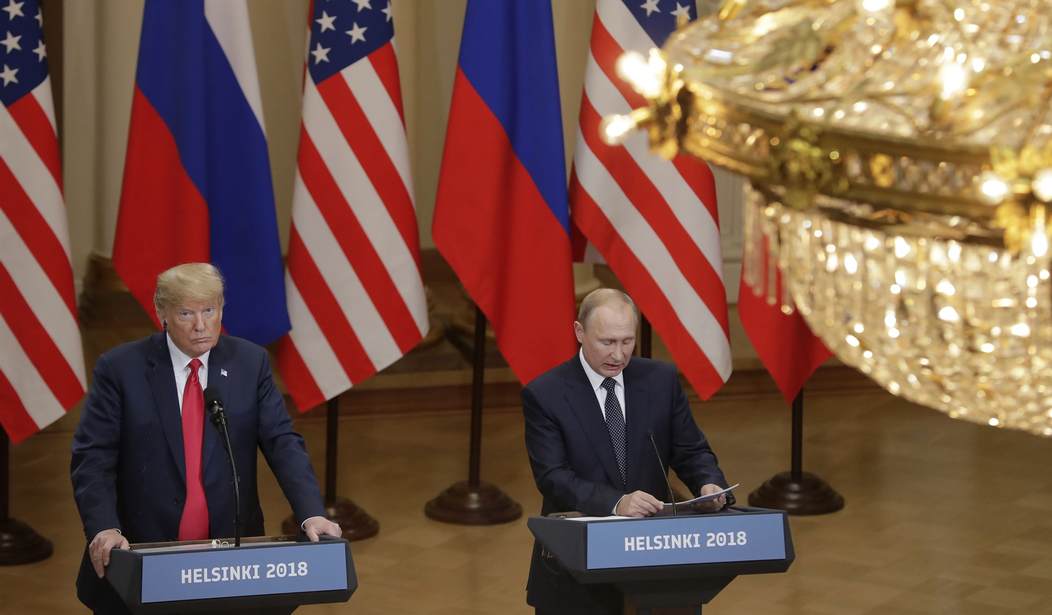Former CIA Director John Brennan never accused his old boss Barack Obama of "treasonous" behavior.
But when Brennan was serving as Obama's homeland security adviser in March 2012, Obama met in South Korea with then-Russian President Dmitry Medvedev and had an exchange that suggested Obama was asking for a favor.
Medvedev was a lame duck at the time -- a leader whom the Congressional Research Service would later politely describe as Vladimir Putin's "handpicked successor for one-term."
"Putin served eight years as president before stepping down in 2008, in compliance with constitutional limits on successive terms," CRS explained.
"His successor was Dmitry Medvedev, a trusted former presidential chief of staff, deputy prime minister, and board chairperson of the state-controlled energy company Gazprom," said CRS. "As prime minister from 2008 to 2012, Putin continued to govern Russia in tandem with Medvedev, who remained informally subordinate to Putin."
When Obama met Medvedev in March 2012, Putin had just been elected to yet another term as Russia's president.
In a conversation with this Putin lackey, which Obama did not realize was being picked up by a live microphone, Obama indicated that Putin's Russian government and Obama's U.S. administration shared an obstacle: American voters, who would not determine until November if Obama would stay in office.
"On all these issues, but particularly missile defense, this can be solved, but it's important for him to give me space," The New York Times reported Obama told Medvedev -- assuming they were speaking privately.
"Yeah, I understand," Medvedev told Obama. "I understand your message about space. Space for you."
"This is my last election," Obama said, according to the Times. "After my election I have more flexibility."
Recommended
"I understand," Medvedev said. "I will transmit this information to Vladimir."
That same day, Mitt Romney, then a candidate for the Republican presidential nomination, properly expressed outrage at what Obama had said.
But in doing so, Romney could not resist naming Russia as America's "No. 1 geopolitical foe."
"This is without question our No. 1 geopolitical foe," Romney told CNN. "They fight every cause for the world's worst actors. The idea that he has some more flexibility in mind for Russia is very, very troubling indeed."
Back then, in the pre-Trump era, CNN's Wolf Blitzer could not believe Romney had the audacity to call Russia our greatest foe.
"You think Russia is a bigger foe right now than let's say Iran, or China, or North Korea?" Blitzer said. "Is that what you are suggesting, governor?"
Romney backed off a bit.
"Well, I'm saying in terms of a geopolitical opponent, the nation that lines up with the world's worst actors," Romney responded. "Of course, the greatest threat that the world faces is a nuclear Iran and nuclear North Korea is already troubling enough."
Back in South Korea the next day, as the Times reported, both Medvedev and White House Spokesman Jay Carney attacked Republican candidate Romney.
"The result was a most undiplomatic pileup on Tuesday, with President Dmitri A. Medvedev of Russia criticizing Mitt Romney, the Republican presidential front-runner, for having views that were decades out of date, the White House siding with the Russians in knocking Mr. Romney," the Times reported.
"It is 2012, not the mid-1970s," Medvedev said of Romney's remarks.
Obama's spokesman Carney echoed Medvedev's attack on Obama's likely opponent.
''In a world where Al Qaeda is so clearly the pre-eminent threat to the United States, and similar organizations, it seems a little inaccurate to make that statement about Russia, where Russia is a country that we have been able to cooperate with on very important issues,'' Carney told reporters.
John Brennan did not tweet then that Obama and his press secretary were making statements "nothing short of treasonous."
But six years later, he did claim President Donald Trump was guilty of making statements in a press conference with Putin that were "nothing short of treasonous."
"Donald Trump's press conference in Helsinki rises to & exceeds the threshold of 'high crimes & misdemeanors.' It was nothing short of treasonous," Brennan tweeted. "Not only were Trump's comments imbecilic, he is wholly in the pocket of Putin."
Yes, Trump's statement suggesting he accepted Putin's denial of Russian interference in the 2016 election -- despite the conclusion of the U.S. intelligence community -- was wrong.
But the next day, Trump admitted as much, saying he misspoke.
"Let me be totally clear in saying that -- and I've said this many times -- I accept our intelligence community's conclusion that Russia's meddling in the 2016 election took place," said Trump.
During the Cold War, the Soviet Union embraced the ultimate strategic aim of imposing its communist vision on the world. Putin's Russia, while nowhere near a model nation, does not embrace that aim.
In some spheres -- such as fighting Islamist radicalism -- it shares interests with the United States. In others, it does not. Its attempt to influence our presidential election demonstrated this.
But the only question regarding Russia that should matter to U.S. policymakers is this: Using constitutional means, how do we advance the freedom, prosperity and security of the American people in our dealings with Russia?
But today, many liberals in Washington, D.C., are asking: How can we use U.S. relations with Russia as a political weapon against President Trump?
























Join the conversation as a VIP Member